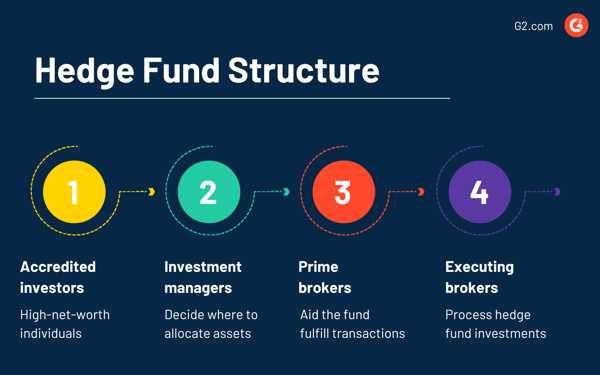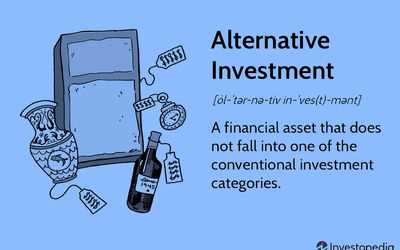Hedge Fund: Definition, Examples, Types, and Strategies

A hedge fund is a type of investment fund that pools capital from accredited individuals or institutional investors and invests in a variety of assets, with the goal of generating high returns. Unlike traditional investment funds, hedge funds have more flexibility in their investment strategies and can employ complex techniques to maximize profits.
One of the key characteristics of hedge funds is their ability to go both long and short in the market. This means that hedge fund managers can profit from both rising and falling prices, providing them with the potential for positive returns in any market condition.
Examples of Hedge Funds

There are numerous hedge funds operating in the financial markets, each with its own unique investment approach. Some well-known examples include:
- Bridgewater Associates: One of the largest hedge funds in the world, known for its macroeconomic approach to investing.
- Renaissance Technologies: A quantitative hedge fund that uses mathematical models and algorithms to make investment decisions.
- Paulson & Co: Known for its successful bets against the subprime mortgage market during the 2008 financial crisis.
Types and Strategies of Hedge Funds
Hedge funds can be classified into various types based on their investment strategies. Some common types include:
- Long/Short Equity: These hedge funds take both long and short positions in individual stocks, aiming to profit from both rising and falling prices.
- Global Macro: Global macro hedge funds make investment decisions based on macroeconomic factors such as interest rates, inflation, and geopolitical events.
- Event-Driven: Event-driven hedge funds focus on investing in companies that are undergoing significant corporate events, such as mergers, acquisitions, or bankruptcies.
Each hedge fund employs its own unique strategies and techniques to generate returns, often combining multiple approaches to diversify risk and maximize profits.
Definition of Hedge Fund

A hedge fund is an investment vehicle that pools capital from accredited individuals or institutional investors and invests in a variety of assets with the goal of generating high returns. Unlike traditional investment funds, hedge funds have more flexibility in their investment strategies and can use leverage and derivatives to amplify returns.
Hedge funds are typically managed by skilled investment professionals who employ a range of strategies to generate profits. These strategies can include long and short positions, arbitrage, event-driven investing, and global macro investing.
Key Characteristics of Hedge Funds:

- Highly Flexible: Hedge funds have the ability to invest in a wide range of assets, including stocks, bonds, commodities, currencies, and derivatives.
- Alternative Investment Strategies: Hedge funds often employ non-traditional investment strategies that aim to generate returns regardless of market conditions.
- Higher Risk-Reward Profile: Due to their use of leverage and complex strategies, hedge funds typically have a higher risk-reward profile compared to traditional investment funds.
- Performance Fees: Hedge fund managers often charge performance fees in addition to management fees, which are based on the fund’s performance relative to a benchmark.
- Limited Regulation: Hedge funds are subject to less regulation compared to traditional investment funds, allowing managers more freedom in their investment decisions.
Overall, hedge funds offer investors the potential for high returns, diversification, and access to alternative investment strategies. However, due to their higher risk profile and limited regulation, they are typically only available to accredited investors with a high net worth.
Examples of Hedge Funds
Hedge funds come in various shapes and sizes, each with its own unique investment strategies and objectives. Here are some examples of well-known hedge funds:
1. Bridgewater Associates: Founded by Ray Dalio in 1975, Bridgewater Associates is one of the largest hedge funds in the world. It is known for its global macro approach and systematic investment strategies.
2. Renaissance Technologies: Founded by James Simons in 1982, Renaissance Technologies is a quantitative hedge fund that utilizes complex mathematical models and algorithms to identify profitable trading opportunities.
3. Paulson & Co: Founded by John Paulson in 1994, Paulson & Co gained fame for its successful bets against the subprime mortgage market during the 2008 financial crisis.
4. Third Point: Founded by Daniel Loeb in 1995, Third Point is an activist hedge fund that seeks to generate returns by actively engaging with the management of its portfolio companies.
5. Man Group: Founded in 1783, Man Group is one of the oldest hedge fund managers in the world. It offers a range of investment strategies, including long/short equity, managed futures, and multi-strategy.
These are just a few examples of the many hedge funds operating in the global financial markets. Each fund has its own unique investment style and track record, attracting investors with different risk appetites and investment objectives.
Types and Strategies of Hedge Funds
Hedge funds employ various types of investment strategies to generate returns for their investors. Below are some common types of hedge funds and the strategies they employ:
| Type of Hedge Fund | Strategy |
|---|---|
| Long/Short Equity | This strategy involves taking long positions in stocks the fund believes will increase in value and short positions in stocks the fund believes will decrease in value. The goal is to profit from both rising and falling stock prices. |
| Global Macro | Global macro funds take positions in various asset classes, such as currencies, commodities, and interest rates, based on macroeconomic trends and events. The fund managers analyze global economic data and make investment decisions accordingly. |
| Event-Driven | Event-driven funds invest in companies that are undergoing significant corporate events, such as mergers, acquisitions, bankruptcies, or restructurings. The fund managers aim to profit from the price movements resulting from these events. |
| Arbitrage | Arbitrage funds seek to profit from price discrepancies in different markets or securities. For example, a fund may simultaneously buy a security in one market and sell it in another market at a higher price, capturing the price difference as profit. |
| Quantitative | Quantitative funds use mathematical models and algorithms to identify and execute investment opportunities. These funds rely on computer-driven trading strategies and often make high-frequency trades based on quantitative analysis. |
| Distressed Securities | Distressed securities funds invest in the debt or equity of companies that are experiencing financial distress. The fund managers aim to profit from the potential recovery or restructuring of these companies. |

Emily Bibb simplifies finance through bestselling books and articles, bridging complex concepts for everyday understanding. Engaging audiences via social media, she shares insights for financial success. Active in seminars and philanthropy, Bibb aims to create a more financially informed society, driven by her passion for empowering others.
